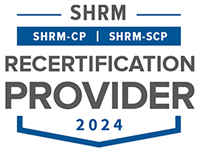
The use of this seal confirms that this activity has met HR Certification Institutes (HRCI) criteria for recertification credit pre-approval.
This activity has been approved for
1 HR
(General) recertification credit hours toward aPHR,
 Traininng.com LLC is recognized by SHRM to offer Professional Development Credits (PDCs) for the SHRM-CP® or SHRM-SCP®.
?
Traininng.com LLC is recognized by SHRM to offer Professional Development Credits (PDCs) for the SHRM-CP® or SHRM-SCP®.
?
There are no “facts” about the future. Everything we think we know about tomorrow is based upon what we think we know about the world today and our assumptions of where that will lead. Successful people develop a heightened sense of assumption recognition through a process of trial and error, but often don’t think consciously about the assumptions they are making.
In this session, Payson Hall argues that improving your ability to detect and make assumptions explicit is a vital career skill. He leads attendees through a series of short experiential exercises to underscore the importance of identifying assumptions to facilitate problem solving, task definition, estimation, and conflict resolution. Participants will gain insights that can be immediately applied in the workplace to improve productivity and decision-making.
[When a project is launched, some of the decisions to proceed are based upon facts, and some are based upon assumptions… do you know the difference?
Assertions about the future are assumptions based upon history and beliefs about the world. The trouble is that people frequently confuse assumptions with facts, with potentially disastrous results. Before you went to bed last night, you planned your morning based upon assumptions about the next day… You probably assumed your alarm would go off and that your car would start. You made assumptions about the traffic patterns on your route to work… If your assumptions were reasonably correct, you probably got to work on time. This can lull you into mistaking the assumptions for truth if your assumptions are correct every day for a month. This also explains why it is so frustrating when the alarm DOESN’T go off, or the car DOESN’T start or other assumptions prove false. “It’s not MY fault I’m late!” you proclaim, “There was an accident on the turnpike!” The accident may not have been your fault. The assumption “There won’t be an accident on Highway 13 September 6 between 7:00 a.m. & 8:00 a.m.” is less certain (and looks a little silly if you write it down and assert it as a “truth” about tomorrow). Because they aren’t facts, but placeholder for facts, assumptions that seem reasonable to one person can seem less reasonable to others. If icy weather was expected, reasonable people might disagree about the reasonableness of your assumptions regarding commute time and traffic patterns. This makes assumptions a prime source of disagreement.
How does this relate to your projects? Project business cases and plans are typically based upon assumptions. These include assumptions about cost, schedule, complexity, resource availability, the value of a successful project, and the likelihood of project failure. Two problems immediately arise:
Failure to identify, document and monitor key assumptions is a major source of project failure. If assumptions are written down, it allows review and provides an opportunity to assure that people involved (and sponsors in particular) believe that the assumptions are reasonable. Writing assumptions down also serves to remind us that they might not be true. Sometimes, worry is a good thing. We don’t tend to check and recheck facts. We don’t expect facts that are true today to become false tomorrow. We sometimes ignore evidence to the contrary when it challenges “facts” from our models of the world. A project assumption list is essentially a partial list of project risks. Any of the assumptions that prove wrong might undermine the business case or plans the project is based on.
The goal of this talk is to help participants recognize assumptions as assumptions and avoid some of the traps of forgetting they are not facts.